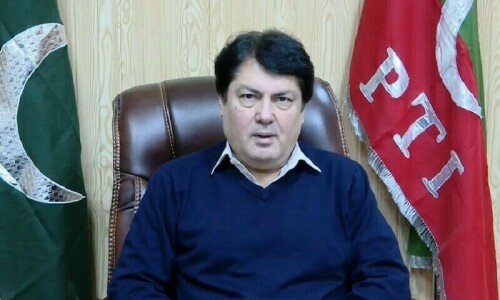Pakistani literature is literature from — as Musharraf Ali Farooqi pointed out in the session ‘Globalisation of Pakistan’s Literature’ — a region that is internationally labelled an “edgy” place. Pakistan has become a hotspot that is stuck in a whirlpool of political turmoil and as a result, literature from the country has thrived internationally.
Aysha Raja, the moderator, indicated that Chiki Sarkar, who could not join the panel, was partly responsible for the effort to bring Pakistani literature to a wider audience. Sarkar has edited the works of many Pakistani writers writing in English. Others on the panel were Daniyal Mueenuddin and Moni Mohsin.
Musharraf pointed out that the impact of Pakistani literature in English-speaking countries was limited, and mostly due to the fact that translations of Urdu literature from Pakistan are not in demand by publishers in the West. So it isn’t Pakistani literature but “Pakistani literature in English, catering to a perceived market” that western publishers are looking for. He was critical of the narrative being built in the West, based on the few novels that were published there, and lauded the Urdu publications coming out of Pakistan for remaining “grounded” and “not performing for the West”.
Mueenuddin countered with the argument that publishers are not philanthropists and bring to bookstores only what they believe will sell. But Farooqi was insistent that the narrative in the West was limited in scope and established Pakistan as a “dangerous” place. According to him, “non-edgy” material from Pakistan, material that did not contain elements of mullah-bashing and terrorism, did not find an easy way to publication in the West.
Raja then asked if authors writing in English were posturing for the western media and pandering to a western audience just by choosing to write in English? Mohsin countered this by saying that she wrote “Diary of a Social Butterfly,” her weekly column, for a Pakistani audience, and just because she wrote it in English didn’t mean she was pandering to any audience outside of Pakistan. She pointed out that the novelists on the panel didn’t have overtly political novels, and that there was no specific narrative being sought by the western audience. Mueenuddin’s book of short stories is about the life of villagers in Punjab, Farooqi’s novel The Story of a Widow is about a woman trying to live an independent life after her husband’s death, and Mohsin’s novels are about “a crazy woman who wants to buy a pair of Prada shoes”.
A similar discussion was held in the session ‘Commonwealth, Nationalism and Globalism’, with Mohsin again a part of it, along with novelists Nadeem Aslam, Shehan Karunatilaka and Jeet Thayil. Both panels addressed similar questions and this one started with a direct one: why do these writers not write in local languages, specifically Urdu?
Mohsin, taking over from her stance in the previous panel, said that she was not pandering to any community and did not feel she was writing in a “colonised” mindset just because she was writing in English. Rather, she felt that the modifications that she and her character Butterfly had made to the Queen’s English had subverted the notion of colonisation. “We have taken ownership of the language … We now show the English the possibilities of their own language,” she said.
Karunatilaka, the writer of Chinaman: The Legend of Pradeep Mathew, pointed out that his novel was not meant for a western audience. In fact, he had not even considered publishing the book outside Sri Lanka, as he did not think there would be interest in obscure Sri Lankan cricketers outside the island country. He did point out that most Sri Lanka-based narratives are about people coming in and going out, not having changed anything about the place, but having changed themselves. Shehan said he was “more interested in the person left behind, the person who was still stuck in the shithole.”
Thayil responded to the question by reading a passage from his book that made liberal use of a local curse word. The passage was definitely something that a western audience would be able to extract less out of than someone from the Indian subcontinent.
Aslam was the most forthcoming about his personal response to the question of writing for a particular audience. He related the now almost mythical story of his family’s migration from Gujranwala to the UK, and his thus being saved from a life of hardship and of working to buy a dowry for his sister. “That is what my life would have been reduced to, had I not moved out of Gujranwala,” he said. It is entirely too easy to imagine that as a reality.
The Q&A digressed from the topics on hand in both panel discussions. A continued discussion on the topic by the panellists might have been more informative than their being questioned again and again on whether they were pandering to the West. Written questions should be passed along to the moderator, who can choose the most perceptive ones, so Q&A time is not wasted. Perhaps the art of questioning appropriately and incisively is something the audience will learn through the course of being introduced to multiple such instances of open and informative debate.
— Sheheryar B. Sheikh















































Dear visitor, the comments section is undergoing an overhaul and will return soon.